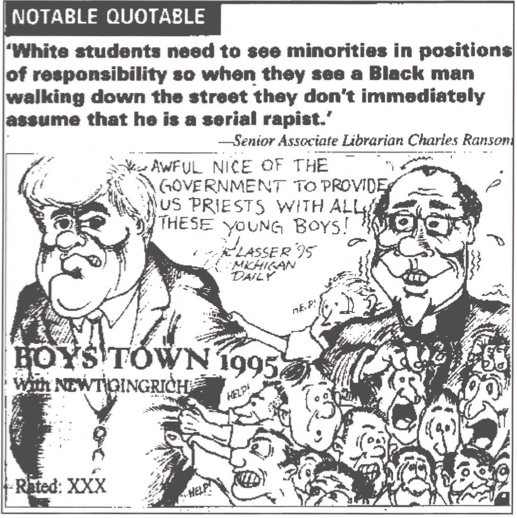Though there was no St. Patrick’s Day Parade in Boston in 1994, there will be one in 1995, but it is uncertain whether there will be one in 1996. The Catholic League has been involved in this affair from the beginning, and will see it through to the end, whatever the outcome. The controversy pits Boston’s gay community against local Irish Catholics. However, the legal implications are national in scope because the U.S. Supreme Court will ultimately decide the issue.
For over 40 years, the St. Patrick’s Day Parade in Boston was sponsored by the South Boston Allied War Veterans Council. The parade celebrated not only St. Patrick’s Day but Evacuation Day, a day commemorating the withdrawal of British troops from Boston during the Revolution. In 1992, the Irish American Gay Lesbian and Bisexual Group of Boston (GLIB) applied for permission to march, but their bid was rejected.
After GLIB lost, it instituted a suit in the Superior Court of Massachusetts. The Catholic League filed an amicus brief siding with the parade’s sponsors, but it did not prevail in court: an injunction was issued mandating that GLIB be admitted to the parade. The Veterans Council appealed the case to the Massachusetts Court of Appeals and ultimately to the Supreme Judicial Court of the Commonwealth. Defeated in all three state courts, they followed the League’s advice and cancelled the parade in 1994.
The case has now been appealed to the U.S. Supreme Court which will review the findings of the Massachusetts Court. The high court recently accepted the case and is scheduled to hear oral arguments in April; a decision is expected by late June. Once again, the Catholic League filed an amicus brief supporting the right of the parade’s sponsors to determine which groups it wants to admit.
In a related matter, in July 1994 the sponsors of the Boston St. Patrick’s Day Parade applied for a permit to conduct the 1995 parade as a protest against the issuance of the injunction. They filed suit in the United States District Court in Boston seeking a declaratory judgment and injunction to compel the City to issue the permit for the parade to be held on March 19, 1995 without the participation of GLIB. On January 17, 1995, the parade’s sponsors won: the court admitted that it could not deny them the right to exclude GLIB as the purpose of this march was to protest the forced inclusion of gays in the annual parade. The result was a victory for freedom of association.
The reason why the initial court decision went against the parade’s sponsors was due to the fact that that march was not billed as a protest. As such, it was the judgment of the Massachusetts Supreme Judicial Court that GLIB had a legal right to participate in the parade under the state’s public accommodations law. It is this decision that will be reviewed by the U.S. Supreme Court.
Many have wondered why the St. Patrick’s Day Parade in New York City can exclude gays but the Boston march cannot. The situation in the two cities, however, is quite different.
In New York, the sponsors are an Irish Catholic group, namely the Ancient Order of Hibernians (AOH), whereas in Boston the sponsors are unrelated to any religion.
In New York, the purpose of the parade is to honor St. Patrick, whereas in Boston the purpose is only partially a recognition of St. Patrick. Given these differences, it was easier for a federal judge in New York to uphold the right of the AOH to bar anyone they wanted. Thus, comparisons between the two parades are inexact. These differences mean that even if the Boston gay group were to win in the Supreme Court, it would not necessarily mean that the AOH would have to accept the Irish Lesbian and Gay Organization (ILGO).
Despite ILGO’s failure to win in New York, it has not prevented the gay group from playing a disruptful role in the annual Irish Catholic parade. Last year 90 members of ILGO were arrested for trying to stop the parade, only to have Judge Robert Sackett of the Manhattan Criminal Court throw out the charges. Judge Sackett stunned New York when he said that the arrests violated the First Amendment rights of the protesters (the League called for his resignation from the bench, and so did the New York Daily News). This year Cardinal O’Connor will be the Grand Marshal and ILGO is planning to make “a strong reaction.” The Catholic League, which will march in the parade, will make sure that ILGO’s “reaction” will not go unanswered.
Notwithstanding the differences between the New York and the Boston parades, the decision by the Supreme Court on the Boston St. Patrick’s Day Parade will have widespread ramifications, and that is why the Catholic League has remained active in the case from the very beginning.
